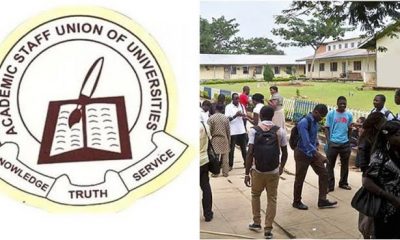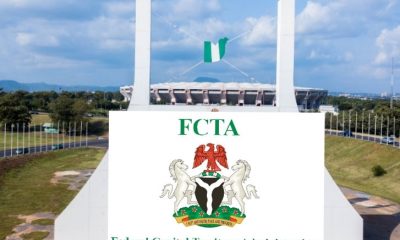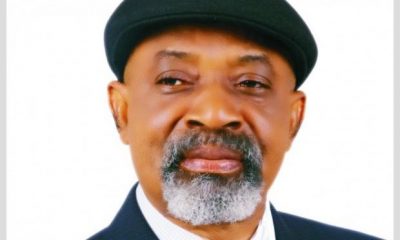Education
Students Attack Minister of Education over ASUU Strike
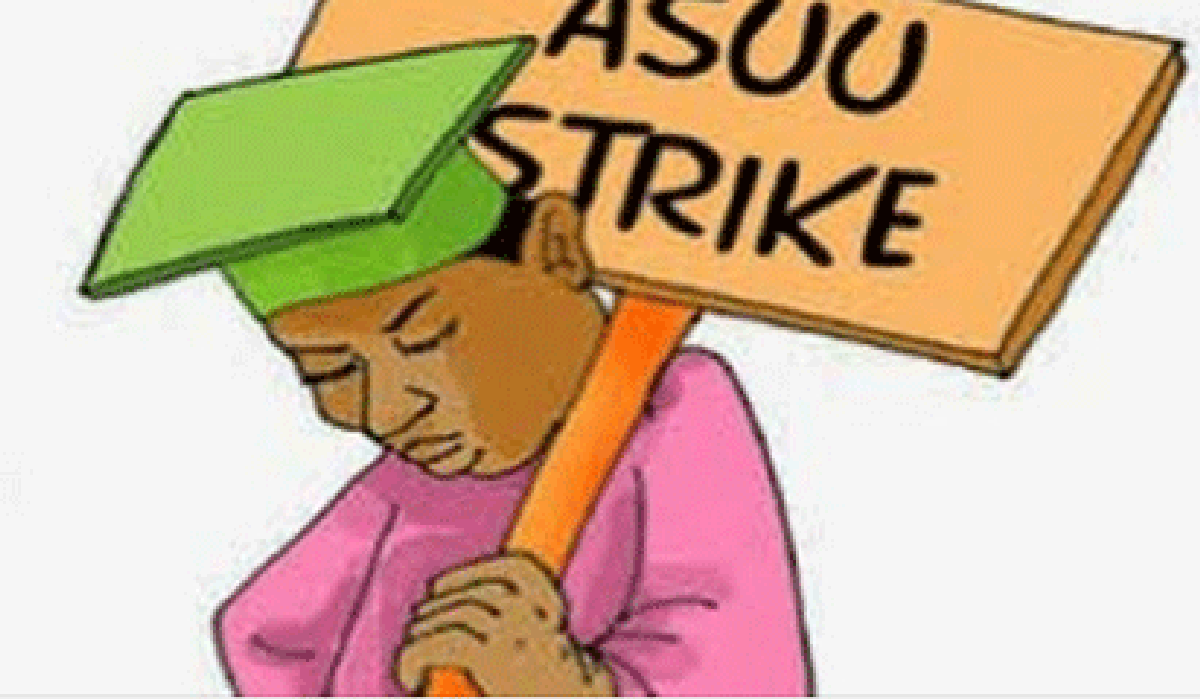
By Laide Akinboade, Abuja & Dan Amasingha, Minna.
Members of the National Association of Nigerian Students (NANS), on Monday, attacked the Minister of Education, Malam Adamu Adamu, over the strike by Academic Staff Union of Universities, (ASUU).
Members of NANS led by its President, Asefon Sunday, who led other students to the Ministry of Education, Abuja to protests the ongoing ASUU strike, condemned the strike embarked upon by (ASUU).
The protest began at the Unity Fountain, from where the protesters marched through several streets of the FCT, causing gridlock and leaving motorists frustrated.
They carried banners and held placards with various slogans and shouted solidarity songs.
The students also blocked some major highways in Abuja. Speaking during the protest, Asefon said, “If education wasn’t freely given to them, they would not be in government. If education wasn’t given freely to them, they wouldn’t be professors today, we want to be professors as well in future, we want to be ministers, we want to be governors and president. But all these cannot be possible until our schools are opened. We are so disappointed in ASUU and Federal Government.”
The NANS President added that the extension of stay on campus won’t only affect academic journey but destabilise life plans.
“It is disheartening to note that the Academic Staff Union of University (ASUU) has gone on strike more than four years cumulatively since 1999. The consequences of this development are grave on the part of the students who are the victims of these incessant industrial actions embarked upon by ASUU as a result of labour disagreement with the Federal Government. The resultant effect of these incessant strikes is inconsistency in scholarship, research, and learning output,” he said.
“At the end of every strike action, ASUU members get their salary, government officials and politicians get their pay, Ministers in charge of the Ministry of Education and his counterpart in the Ministry of Labour get their pay and allowances for unproductive meetings with ASUU, but the students get nothing than the inability to get mobilised for NYSC (National Youth Service Corps) as a result of age limitation, limited job opportunities as a result of age limitation, untimely death of students traversing the poor Nigerian roads unnecessarily, all as a result of incessant ASUU strike.
“It is more worrisome that most of the industrial actions could have been avoided if the government has been responsible enough to fulfil promises/agreements freely entered with ASUU over the years and fulfil their part of the bargain. Public tertiary institution in Nigeria has taken a downward slope in recent year and there is an urgent need to fix the system. Many students no longer trust the education outcome of our tertiary institutions as a result of the incessant strike and infrastructural neglect from the government.
“These developments account for the high level of migration of Nigerian students abroad in search of stable and quality education. Many of our students are currently trapped in war-ravaged Ukraine as a result of the incessant strike in our universities and lack of adequate infrastructural development.
“We are therefore compelled to take the following positions: That the Federal Government must as a matter of urgency honour every agreement freely entered with ASUU and renegotiate areas that need renegotiation in good faith with ASUU while we call on ASUU to be open-minded, progressive, and be realistic in their terms.
“Federal Government must do all it takes to convince ASUU to suspend its strike and return to the classroom immediately to ensure continuity in the academic calendar We call on Federal Government to consider immediate and urgent investment in revitalizing public tertiary institutions in Nigeria to accommodate our growing population and the emerging needs of this century.
“We demand that Nigerian students who are the victims of the incessant ASUU strike must be represented in all negotiations between the Federal Government and ASUU. We also demand that government representatives and ASUU representatives at the negotiations must show proof that their children attended or are attending a public university in Nigeria. We, therefore, plead with ASUU to call off the strike while they devise new means of holding the government accountable without necessarily going on strike.”
The Minister of Education, Malam Adamu who invited the students leaders for a meeting inside his office was accused by the students leaders of walking out on them.
The students who came out of the meeting visibly angry, came after the Minister and were ready to lynch him for walking out of the meeting.
According to NANS President, they asked the Minister why the Education sector was falling and the Minister walked out on them.
He said in anger, “I told him, ‘Sir we saw you on social media last week, celebrating your son who graduated from one of the Universities in United Kingdom’ and he said ‘that question should not be from you’ and he walked out on us. What an insult because we asked him why is Education sector in Nigeria failing and he walked out on us. We are not praise singers of anybody”.
In Minna, the Niger State capital ational angry university students on Monday carried out a peaceful protest in an absolute support to the strike action embarked by ASUU.
The students drawn from Ibrahim Badamasi Babangida University, Lapai, Federal University of Technology Minna and other institutions blocked the Minna busy City Gate in solidarity with members of ASUU who are on one month warning strike.
The students in their hundreds chanted solidarity songs holding placards with inscriptions that reads “Education is our right, Federal Government Settle ASUU and Enough is Enough” among others.
They described the protest as a warning to the Federal Government and called on the authorities to meet the demands of the lecturers to make learning convenient for them.
President Student Union, IBBU Lapai, Jibrin Mohammed and his FUT counterpart, Shuaib Yusuf told our correspondent in separate interviews that the students would continue the protest in support of the lecturers stressing that ASUU’s strike in justifiable.
Education
Strike Looms as ASUU Accuses FG of Endless Agreement Negotiations, Others
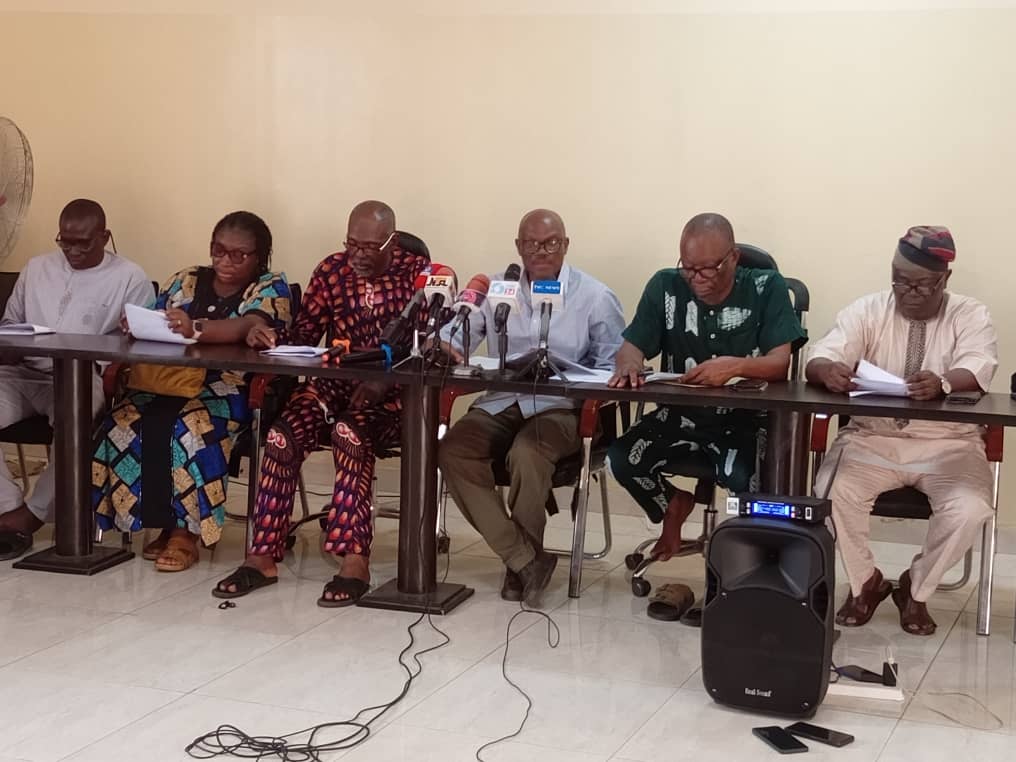
By David Torough, Abuja
The Academic Staff Union of Universities (ASUU) has once again raised the alarm over the Federal Government’s persistent failure to honour past agreements, warning that another nationwide strike may be imminent.
ASUU’s new President, Professor Chris Piwuna, at a press conference in Abuja on Friday criticised the government’s inaction on critical issues affecting Nigerian universities.
Piwuna demanded the immediate implementation of all Memoranda of Understanding (MoUs) and Memoranda of Action (MoAs) signed since 2013.
ASUU emphasised that fixing Nigeria requires fixing its universities, which are plagued by poor funding, stalled agreements and government neglect.
The Union also demanded the release of withheld salaries from the 2022 strike and payment to lecturers on part-time and sabbatical appointments affected by the IPPIS payroll system, while condemning political interference in university administration, unlawful appointments, and the undermining of institutional independence.
It further called for an education summit, proper implementation of past agreements, and a stop to the misuse of TETFund resources. It warned it will not remain passive while its members’ rights are trampled.
ASUU urged the government to resolve all outstanding issues to avoid further disruption. While open to dialogue, the union signaled potential industrial action if demands are ignored, reaffirming its commitment to the struggle for quality education.
“Almost three decades since Nigeria’s return to civilian governance, it is not yet Uhuru. The country is still pathetically trapped in the web of multifaceted political malfeasance graphically sign-posted by prebendal politics, mindless manipulation of electoral processes, brazen nepotism, and deliberate subversion of people’s will at every level of governance.
“The sum total of all these is that transparency and accountability have become rare commodities in the hands of the managers of the Nigerian state. Consequently, the generality of citizenry have become despondent, having lost hope and faith in government and its agencies.
“If given the desired attention, Nigeria’s universities should provide the solution ground to solving its multi-faceted and multi-dimensional problems. ASUU has remained focused in the struggle for improved funding and revitalization of these institutions.
“A starting point to achieve this noble goal is to prevail on government to address all outstanding issues in our previous engagements. This will create a conducive atmosphere for addressing the welfare issues of Nigerian academics for the optimal discharge of their statutory responsibilities as the think-tank of the country and mentors for future leaders in all aspects of national development. ASUU remains open to discussion in this respect.
“However, the Union would not continue to look helpless while the rights of its members are being trampled upon and washed away with reckless abandon.”
ASUU stated that the level of implementation of the 2009 FGN/ASUU Agreement is not encouraging, saying that although a few issues are partially implemented, many remain unaddressed.
These, it said include the conclusion of the renegotiation of the 2009 Agreement based on the Nimi Briggs Committee’s draft agreement of 2021; release of withheld three-and-a-half months’ salaries due to the 2022 strike; release of unpaid salaries for staff on sabbatical, part-time, and adjunct appointments affected by the Integrated Payroll and Personnel Information System (IPPIS); release of outstanding third-party deductions such as check-off dues and cooperative contributions; funding for the revitalization of public universities; payment of Earned Academic Allowances (EAA); concerns over the proliferation of universities by federal and state governments; non-constitution of some universities’ governing councils; and adoption of the University Transparency and Accountability Solution (UTAS) in place of IPPIS.
It noted that the government agreed to mainstream the EAA into salaries with the creation of an irregular allowance as a budget line in the 2026 Budget, after releasing N50 billion for the backlog and budgeting N29 billion for the payment of 2025 Earned Academic Allowances and agreed to release N150 billion as a revitalisation fund within four weeks from April 2025.
“However, we are still waiting for government to fulfil these promises. The Union has also reached an understanding with the Yayale Ahmed-led Committee, following the review of the report of the Nimi Briggs-led FGN-ASUU Renegotiation Committee in December 2024. Again, ASUU members have been left in limbo, waiting for the signing of an agreement five months after.
“Delegates at the UNIBEN National Delegates Conference exhaustively evaluated the government’s disposition in resolving outstanding issues with the Union and expressed regrets that nothing has significantly changed in the last two years.
“The irreducible minimum that can guarantee industrial harmony in the Nigerian University System (NUS) is for government to speedily address all outstanding issues including conclusion of the renegotiation of the 2009 FGN/ASUU Agreement, payment of the withheld three-and-a-half months’ salaries, release of the backlog of promotion arrears, payment of withheld salaries of sabbatical and part-time lecturers on account of not signing into the discredited IPPIS, and addressing the unjust victimization of ASUU leaders and members in some state universities.
“Beyond these, we demand a faithful implementation of all issues arising from our previous Memoranda of Understanding (MoUs) and Memoranda of Action (MoAs) government signed with ASUU since 2013.”
ASUU also called on state governors and visitors to these universities to, without further hesitation, resolve lingering issues and reinstate its members without delay in the interest of justice and industrial peace.
On the erosion of university autonomy, the union expressed deep concern. “ome recent developments in Nigeria’s public universities are of grave concern to our Union. We are discomfited by the ongoing attempts to completely erode the autonomy of public universities by the political class and the bureaucrats.”
community
UTME: JAMB To Hold Additional Mop-up Exam for Absent Candidates

Joint Admissions and Matriculation Board (JAMB) says it will conduct additional mop-up examinations for candidates who missed the 2025 Unified Tertiary Matriculation Examination (UTME).
JAMB Registrar, Prof. Is-haq Oloyede, stated this on Wednesday in Abuja at a meeting with key stakeholders to address the challenges encountered during the 2025 UTME.
Oloyede said that the board would accommodate the estimated 5.
6 per cent of candidates who missed the examination by organising a special mop-up exercise.He said that the board had extended the opportunity to all the affected candidates, regardless of the reasons for their absence.
“Normally, we hold one mop-up nationwide for those with one issue or the other.
“But this time, we are creating a new mop-up. Even those who missed the earlier examination due to absence, we will extend this opportunity to them.
“It is not that we are doing something extraordinary; in class, you make up an examination when students miss it for one reason or the other; we just don’t allow abuse of that.
“So we will allow all the candidates who missed the main examination for any reason to take part in this mop-up,” he said.
Oloyede criticised some public commentators who misunderstood and misrepresented the role of UTME, while clarifying that UTME was a placement test and not an achievement test.
According to him, the purpose of the examination is to rank candidates for available spaces in institutions and not to measure intelligence or overall academic potential.
The registrar further stated that high UTME score was not the sole determinant of admission, adding that combined performance, including post-UTME scores and school assessments, could significantly affect a candidate’s ranking.
While acknowledging the emotional strain experienced while announcing the UTME results, he noted that this was not indicative of an institutional weakness.
He expressed JAMB’s commitment to resolving issues affecting the examination process, even as he rejected comments suggesting that the administrative failure was due to incompetence or ethnic bias.
“I want to say this clearly, particularly because I accepted responsibility, not because I do not know how to do the work.
“I say it for the fourth time that no conspiracy theory is relevant to this case.
“Something happened; like people who have been doing something well for years and something just went wrong. That I should now throw them under the bus? No,” he said.
Oloyede, who frowned at those exploiting difficulties to promote ethnic or conspiracy-driven narratives, urged stakeholders to stop ethnic profiling in the education sector.
According to him, many of the criticisms of JAMB’s operations are rooted in ignorance.
The registrar, however, commended his team’s efforts, while also appreciating the resilience shown by candidates, many of whom, he said, had continued their exams, notwithstanding the various challenges. (NAN)
Education
Using CBT for WAEC Will Adversely Affect Sciences— Ebonyi Reps Member

A Federal Lawmaker from Ebonyi, Chief Chinedu Ogah, has declared that the usage of the Computer Based Technology (CBT) for the West African Examination Council (WAEC) would adversely affect science subjects.
Ogah, who represents Ikwo/ Ezza South Federal Constituency at the House of Representatives, made the declaration on Tuesday while speaking with newsmen on WAEC’s proposed plan to introduce CBT from 2026.
The lawmaker said that the move would affect several scientific applications practically used to access students in WAEC examinations.
“What will happen to several scientific.mixtures, equations, mathematical applications among others practically applied during WAEC examinations?.
“Such measures are evidently not feasible and will adversely affect sciences in our educational curricular.
“Science is practical and the earlier we understand this, the better for all,” he said.
He noted that the glitches recorded during the recent Joint Admission and Matriculation Board (JAMB) examination was unfortunate.
“The registrar should review the activities of its Information Communication Technology (ICT) department.
“It is ridiculous for JAMB to conduct the examination without adequate provisions for the ease of candidates,” he said.
Ogah urged people from the south east zone which the glitch was touted to have targeted, to embrace the home grown technology it was known for.
“We are known for technology and innovation.
“Government of south east states should equip our schools with ICT so that students would be acquainted with its usage, early,” he said. (NAN)


